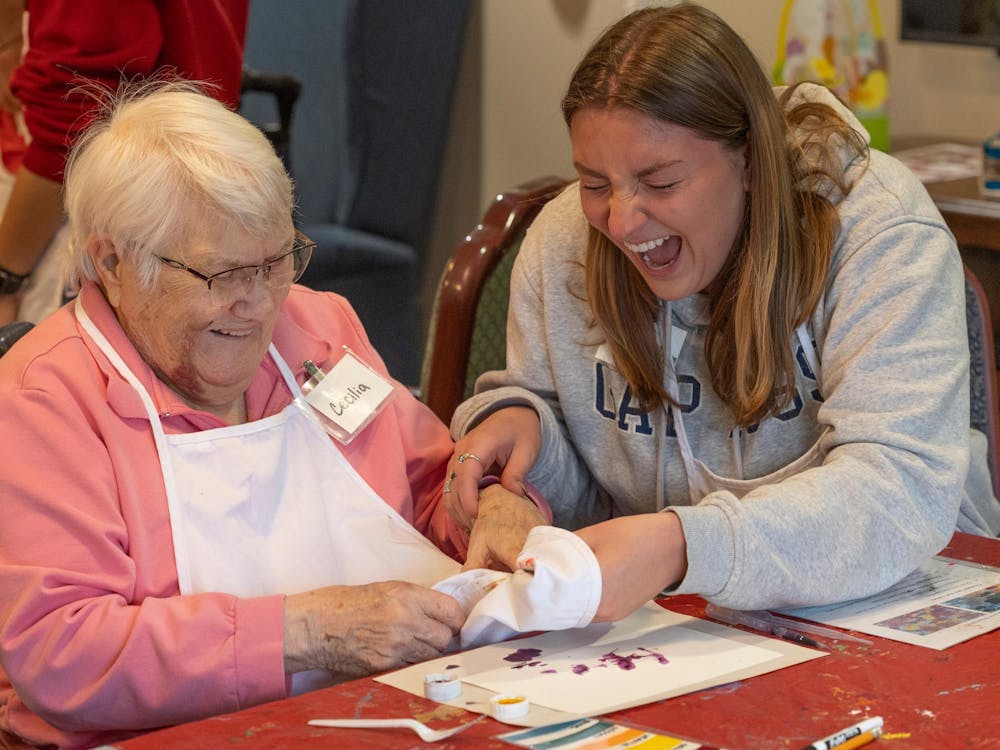The Miami University Police Department (MUPD) has changed the wording on its sexual assault safety bulletins to include anti-victim blaming language.
This language was changed and sent out to university students in a safety bulletin on Feb. 18.
The crime reduction tips for sexual assault safety bulletins now include the following:
“Sexual assault is a crime and is never the fault of the victim. While nothing is failsafe, here are some suggestions everyone may want to consider to prevent experiencing such a crime.”
Lauren Doepke, a junior environmental earth science and environmental science major, advocates for the safety of students and is passionate about sexual assault prevention. She is a member of Sexual Assault Survivor Support (SASS) and was an Associated Student Government (ASG) senator last year.
Last semester, working with two other AGS senators, Izzy Arbetter and Trey Petrella, Doepke authored resolution SR192009: a resolution to reform Miami University Police Department’s (MUPD) sexual assault safety bulletin crime and reduction tips. The resolution was submitted to ASG on Nov. 19, 2019.
Dopke believed the language in the bulletins could be improved, as the ideology behind it promoted victim blaming.
“The only place that Miami had anti-victim blaming language was in the section that they are required to have. It is literally a copy and paste statement,” Doepke said.
The resolution suggested the “crime reduction tips do not have blanket statements explaining that sexual assault is never the fault of the survivor,” and “peer institutions such as the Ohio State University, Ohio University and The University of Cincinnati, have blanket statements explaining that sexual assault is never the fault of the survivor.”
Doepke, Arbetter and Petrella wrote suggested crime reduction tips for MUPD, but Miami and Lori Minges, the Clery coordinator, had the ultimate call.
The Clery Act, according to Know Your Title IX, is a federal law that requires colleges to report crimes that occur on campus — and school safety policies in relation to that crime — requiring universities to send timely warnings to the school community when there are known risks to public safety on campus.
Gabby Dralle, Title IX coordinator for Miami, was not able to be reached for comment.
Enjoy what you're reading?
Signup for our newsletter
After the resolution was passed by ASG, they worked with MUPD, Minges and the Office of Communication to reform the crime reduction tips on safety bulletins related to sexual assault.
“We weren’t really wound up with what the wording was as long as we weren’t saying something that people perceived as victim blaming because that is the last thing we would want to do,” MUPD Chief John McCandless said. “We are happy with whatever wording people are comfortable with and amenable to make changes.”
Oxford Police Department (OPD) also works to promote anti-victim blaming language in meetings with victims and in cases.
“When we meet with a victim or a survivor of sexual assault, we never ever want to use any type of victim blaming language,” David King, detective sergeant for OPD, said. “At the end of the day, it is the suspect that did it, not the victim.”
However, this is not the first time that language was changed on the bulletins to prevent victim blaming, McCandless said.
“Five, six or seven years ago, we were approached by students that the wording [on the safety bulletins] was victim blaming,” Jones said. “At the time, we were working with Women Helping Women, and they suggested wording that would be better. We just wanted to be sure that we are following the Clery guidelines.”
This semester, the number of reported sexual assaults is down from this time last year.
On Sept. 4, 2019, there were four sexual assaults reported since Aug. 27, 2019 with MUPD and (OPD). As of Sept 4, 2020, there have been two sexual assaults reported with MUPD and OPD.
“I get these questions a lot from the student newspaper over my 15 years about ‘why did the [number of sexual assaults] spike go up’ and ‘why did it go down,’” McCandless said. “I’m not sure. I do really believe people feel more comfortable reporting to us, and we are doing a better job of educating the community, but I’m not expert to why they are not.”
Doepke believes COVID-19 has allowed for the decrease in reported cases of sexual assault. Bars in Oxford, including Brick Street Bar and Grill and The Woods’ only take reservations for customers to sit down to prevent the spread of the virus, and there is a drastically lower number of students on campus compared to last semester.
“It is fairly known that in Oxford and in all schools, bars play a quintessential role in rape culture,” Doepke said. “Many survivors I know have their ordeal start at Pachinkos, Brick Bar and Grill and New Bar. But when you have a sit-down bar, you are able to more easily be a bystander.”
King wishes the decrease in sexual assault reports was due to awareness but believes it is truly speculation.
“I think a big part of it is that there aren’t as many students back this year, so the population is lower, which leads to a decrease in everything,” King said. “We’ll see. If everybody comes back this semester and it is still going down, I would like to think that there is more awareness and the message is getting across.”
Miami’s sexual assault resource guide can be accessed here. Along with information on the reporting process, the site offers advice on what to do if you or someone you know is sexually assaulted.
Sexual assault survivors who wish to report an incident can contact campus security enforcement, including the Miami University Police Department at 513-519-2222, the Oxford Police Department at 513-523-4321, the Coordinator of Sexual Assault Prevention and Response Program at 513-529-1870 and any athletic coaches, academic or student organization advisor.
If students wish to speak to a non-mandatory reporter for confidential support, they can call or text Miami’s campus-based support specialists from WomenHelpingWomen at 513-431-1111.
WomenHelpingWomen is available from 10 a.m. to 6 p.m. every day and is also reachable through email at MU@womenhelpingwomen.org.
More information and resources can be accessed at womenshealth.gov.




